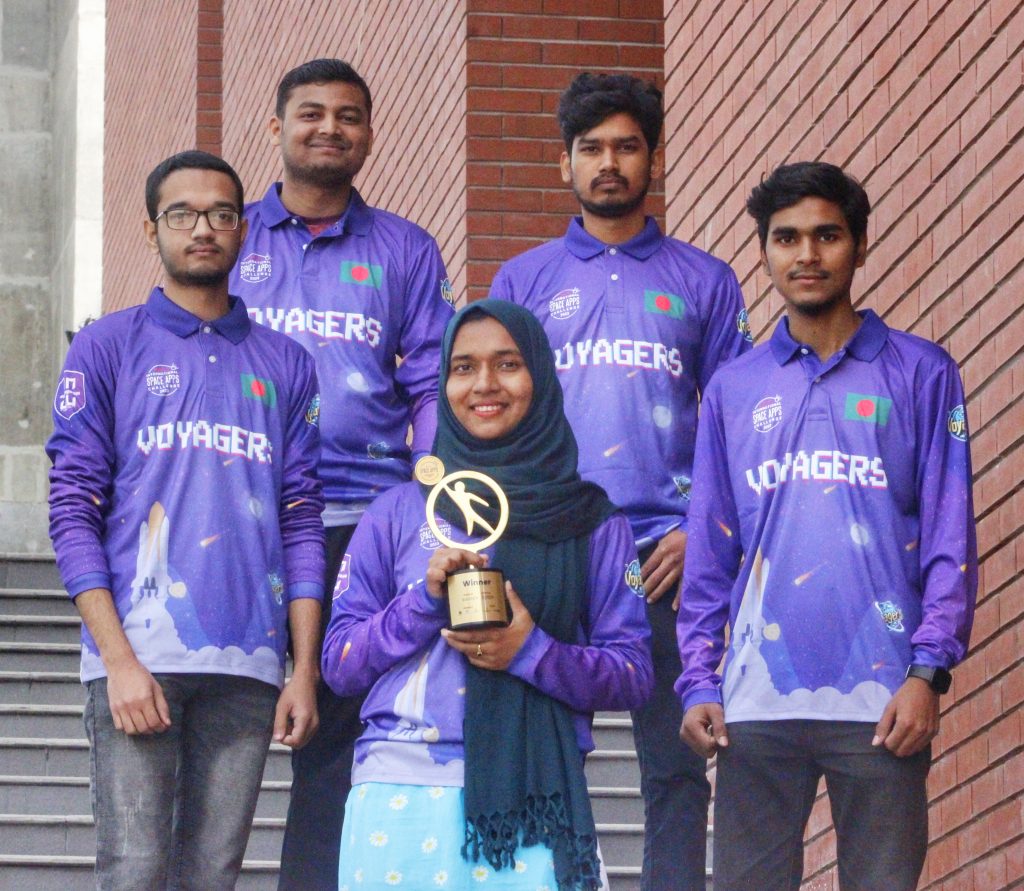With each passing year, the NASA Space Apps Challenge takes a grander stage, making it one of the most competitive events around the world. This year was no different — 8,715 teams represented 152 countries across 30 categories. And Team Voyagers from Varendra University of Rajshahi scored the hat-trick championship for Bangladesh by clinching the global title in the Best Storytelling category. The team, comprising Md Khalid Shakib, Mst Fahmida Akter, Md Shakhawat Hossen, Md Abdul Malek and Md Atik, shared its two cents on how they pulled off this feat.
Assessing the Category
Team Leader Md Khalid Shakib, testing the waters with his participation in 2022, acknowledged his drawback of the subject knowledge and decided to try for the storytelling category, capitalising on his strength of explaining anything easily. His teammate Mst Fahmida Akter also mentioned that the limited time and knowledge on different topics or categories is what had them opt for shifting their focus on a globally relevant issue. In their case, the prompt was titled “Everything Starts with Water.” And the task was to create a visual tool to help students better understand the complete path of water across the entire earth system and how the availability of this critical resource is affected by our changing climate.
Forming the Team
When the mission is a global championship, forming a well-rounded team is crucial. The comfort of familiar faces or the professionalism of new teammates, overlapping skill sets at the expense of complementary team work — such variables are to be accounted for. It is a good practice to form the team after the prompt has been revealed, said Shakib. Each member of Team Voyagers did have a separate role to play. Shakib was the video editor and script writer, Mst Fahmida Akter the researcher, Shakhawat Hossen the UI/UX designer, Abdul Malek the Flutter developer and Md Atik the level designer.
Shakib realised that the synergy matters just as much as the software. So, while headhunting for the team, he followed his juniors on social media to understand their strengths — looking for students in the area, students who may be less skilled but not arrogant, and students not concerned about who contributed more or less. Additionally, he minimised meetings for everyone to work independently while sharing their opinions.
Formulating the Solution
Since they had to connect with the target audience of high-schoolers, they had to make it both engaging and easy to comprehend. Their aspiration was to inspire active participation from the audience, says Fahmida. Hence, the solution was designed in the form of a game — Aqua Explorer. The prototype features 5 levels, each of which expound on different stages of the water cycle using embedded videos, charts or open source database and interactive quizzes to test the user’s newfound knowledge. The prototype can be accessed on figma.com.
Creating the Differentiation
In a competitive event of different stages like this one, what can be more challenging than being better is being unique. Given such a specific prompt, the scope of creativity becomes narrow. Thus, Shakib and his team tried to grasp the psychology of the judges via thorough reading of the guidelines and mark distribution. Since they had to submit a 240-second pitch video for the local round and a 30-second one for the global judgement, they realised that the judges may not have enough time to go through or appreciate the nitty gritty of the projects. So, they focused more on writing a streamlined script for the videos. And they grabbed attention by implementing various AI tools since NASA emphasises the use of AI in project management.

Enduring the Journey
International competitions with regional and national rounds come with the added challenges of endurance and consistency. The probability of scheduling conflict being high, uncooperative nature of authority figures can break the team morale. Such was the case of Team Voyagers too. The 36-hour national level hackathon coincided with their mid-term exams, which resulted in them not being able to secure top 50.
Later on, virtual rounds proved to be beneficial for them as they had more time to prepare. Despite a large portion of the competition being held online, they were guided well by the Project Coordinator of NASA Space Apps Challenge Bangladesh — Toufiq Elahi Plabon — as well. Shakib added that if someone is deeply motivated, s/he will get necessary support from BASIS.
When asked about the struggles as a Bangladeshi student participating in this challenge, Shakhawat mentioned having to make do with low-spec setups because of the high prices and tax on tech products. He further remarked on the uncooperative culture around competitions in Bangladesh. They compromised heavily on their academics for this competition. But not all parents foster a supportive environment.
The team is open to exploring future opportunities with this project. Being students, some of whom have part-time jobs, they find it challenging to dedicate more time behind this project. They are seeking collaboration from voluntary climate activism organisations to take their vision to the next level. Details of their project can be found spaceappschallenge.org.
